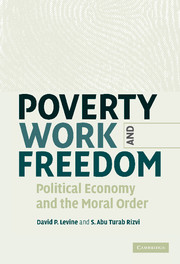Preface
Published online by Cambridge University Press: 22 September 2009
Summary
We speak about the poor as if we know who they are. We speak, for example, as if the arbitrary definitions used by government agencies to determine eligibility for their programs tell us who is poor and who is not. If we know who are the poor, the problem is what, if anything, to do about them. For some, knowing what to do about poverty means becoming an advocate for the poor, or for what their interests are imagined to be. Then, the problem becomes one of representation of interests, and possibly of the struggle on behalf of those interests against the interests of those who are not poor and whose interests might be opposed to the interests of the poor.
Sometimes we speak about poverty as if it were defined by wealth. The poor are those who do not have enough wealth. This is the approach taken by Adam Smith in the first paragraphs of The Wealth of Nations, where he defines the problem of political economy as the problem of wealth and poverty. When we speak this way, poverty often becomes a relative matter; the more wealth on average in our society, the more wealth we need to avoid being poor. This way of thinking about poverty makes it an implication of inequality, which, for some, makes poverty a problem of injustice. This follows if we convince ourselves that those who have less (and therefore are poor) do so because others have more.
- Type
- Chapter
- Information
- Poverty, Work, and FreedomPolitical Economy and the Moral Order, pp. vii - xPublisher: Cambridge University PressPrint publication year: 2005

